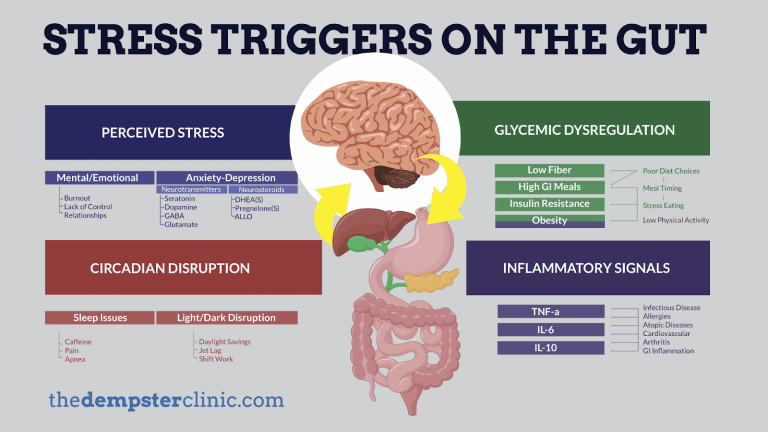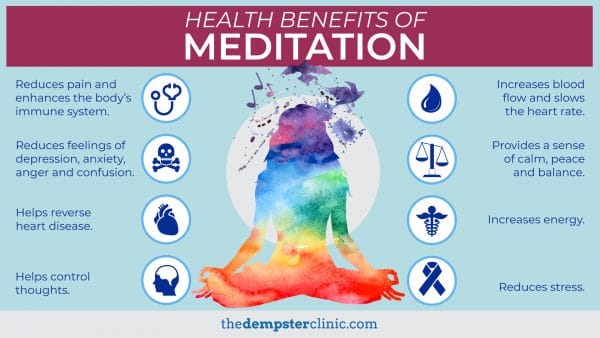“Gut-wrenching” experiences are no metaphor; living with stress really will wreak havoc on your stomach. It turns out that your belly is more attuned to your mental state than you realize, and unaddressed anxiety can have far-reaching consequences for your gut.
Below, I’ve unpacked the relationship between stress and your digestive system to help you understand how to keep yourself healthy- both mentally and physically.
The Connection Between Stress and Your Digestive System
How much of an impact does stress have on your digestive system? To answer that question, let’s look at how intimately connected the two are.
Your conscious brain has a closer connection to your stomach than it does with almost any other organ. Just the thought of food is often enough to trigger the flow of digestive juices in your gut and stimulate saliva production. This connection goes both ways, meaning that stomach problems can be both triggered by stress AND be the cause of stress.
This link has real implications for health, as 35% to 70% of people struggle with functional gastrointestinal disorders at some point in their lives. While stomach problems usually have biological, social, and psychological triggers, your stress level is a significant factor, thanks to the gut-brain axis.

Your Gut-Brain Axis and the Fight-or-Flight Mentality
The biological forces that keep you alive (like your heartbeat and respiratory system) are regulated through the autonomic nervous system, which is a complex network of nerves that extends from the brain to all major organs. The nervous system is in constant communication with your gut, thanks to the gut-brain axis. Once it senses that food has entered the stomach, the neurons lining the digestive tract signal your digestive muscles to start stimulating contractions that move food throughout the system, breaking it down into its nutritional components along the way.
However, this close connection between the gut and brain means that many factors can compromise digestion. For instance, feeling enough stress to trigger your fight or flight tendencies will shut down blood flow and decrease digestive secretions. This will slow down your metabolism or even stop it entirely, as the body will turn all its energy towards defending itself against the perceived threat. Side effects of this process can include abdominal pain, constipation, inflammation, and even diarrhea.
Other ways that stress can cause problems within your digestive system include the following:
- Triggers spasms within the esophagus
- Increases acid production in your stomach, leading to indigestion
- Stimulates nausea by shutting down digestion
- Promotes extreme colon reactions like diarrhea or constipation
- Increases the symptoms associated with stomach ulcers, Celiac Disease, or Inflammatory Bowel Disease
- Changes the composition of microbes within the digestive system.
Common Stomach Symptoms of Anxiety
Digestive problems can have many causes, so how can you tell if yours are related to stress? A collection of common symptoms is often a clue. Stress can affect hundreds of small behaviours in your day, from how you breathe to the amount you eat, and even the hormones that your body releases.
There aren’t set patterns for how anxiety will trigger stomach problems. Some people only feel discomfort during severe anxiety attacks, while others experience low-level unpleasant symptoms throughout the day that they don’t mentally connect to their stress.
If you often experience any of the following symptoms, your stress might be to blame.
Sleeplessness

Perhaps surprisingly, insomnia is a common trigger of anxiety-induced stomach problems. That’s because anxiety often makes it hard to fall asleep, and a lack of sleep can affect how you process food and nutrients. The end result? Improper digestion and a painful stomach.
Indigestion
Indigestion is so common for those with persistent anxiety that it’s often overlooked as a direct symptom. Though it’s rarely clear what the precise trigger for indigestion is, it’s usually related to the hormones and neurotransmitters released from anxiety. For example, stress releases adrenaline into your system, a compound that changes how your body processes glucose and other nutrients. This digestive change can quickly lead to stomach discomfort. Likewise, anxiety promotes stomach acid production, which can increase your chances of suffering from poor digestion.
Gas and Bloating
Does a bout of anxiety leave you feeling like you have butterflies in your stomach? You can blame that feeling on gas and bloating- two common symptoms of stress. This is caused in part because of the way that stress affects your ability to process nutrients, but the primary reason is swallowing too much air (usually due to hyperventilating). Hyperventilation allows air to build up in your stomach, which increases your risk of both passing gas and belching, two triggers of intestinal discomfort.
Hypersensitivity
Those who are prone to hyperventilate are also at risk of another symptom, hypersensitivity. This is a mental condition that makes it hard to ignore even mildly unpleasant feelings in the body, which means that stomach problems can seem worse than they are, leading to a vicious cycle of even more anxiety (and then more stomach problems).

Nine Ways to Combat Stress for Better Digestive Health
Now here’s the good news. You don’t have to let anxiety maintain its control over your stomach. There are steps you can take to manage that anxiety and keep yourself in better shape overall. Below are some of my recommended recommended strategies to keep your stomach feeling its finest.
1. Take a News Fast

When scrolling through social media, it’s easy to assume that nothing good is happening in the world. Stop waking up to the glare of your phone screen, and instead take a temporary news fast (print newspapers and magazines included). Following this practice for just seven days is enough to significantly lower your stress levels, leaving you feeling healthier and more optimistic about the events in life you can control.
2. Improve Your Social Life
Research shows that staying home alone and forgoing in-person social relationship has real ramifications for your health. For instance, a Cleveland Clinic Study found that being social on a regular basis played an essential role in limiting the impacts of depression and even moderated the amount of pain that participants perceived from physical problems (like digestive issues). Further research in 2003 showed that healthy social interactions could reduce stress and promote physical healing.
This means that maintaining your social ties may lead to less anxiety and a little more healing for your digestive system.
3. Practice Relaxation Strategies
You can reduce stress-related health problems if you incorporate intentional ways to relax into your life. If you feel yourself falling into anxiety, play some soothing music, practice yoga, or even sign up for a massage. Research shows that Irritable Bowel Syndrome (IBS) sufferers found significant relief from symptoms like gas, bloating and diarrhea when they practiced intentional Relaxation Therapy, so rest assured that taking some daily “me time” is beneficial for your belly.

4. Start a Meditation Habit
One proven way to reduce anxiety is to practice being present through meditation. A meditation routine enhances your awareness of the present moment, which helps to put anxiety-inducing events in perspective so that you feel calmer and in control of the situation.

5. Talk it Out
Feel behaviours can relieve stress faster than talking through your concerns with someone that cares about you. Whether you choose to confide in a reputable therapist or a friend at coffee, putting words to your anxiety is the first step towards releasing it from your body so that you don’t suffer its physical consequences in your digestive system.
Can talking about your problems soothe your stomach? The science shows it can. One study of IBS sufferers found that a significant majority experienced improvement in their symptoms after just 12 weeks of talk therapy.
6. Eat Healthy Foods
It’s easy to attempt to deal with emotional stress with a big bowl of ice cream, but the indulgence won’t do anything but set your body back. Eating food that’s filled with fat, artificial ingredients, and processed sugars tax your liver and leave you feeling sick and bloated, so stick to fiber-rich fruits and vegetables for optimal digestive health instead.
7. Reduce Your Reliance on Substances

Smoking, drinking (both alcohol and caffeine), and even indulging in anti-anxiety medications are all ways we try to manipulate our moods, especially during times of stress. Unfortunately, these coping mechanisms tend to be hard on the digestive system. For instance, anti-inflammatory medications that are often used for stress headaches can damage your digestive tract if you start to over-rely on them.
8. Get Plenty of Sleep
Daily life is harder to cope with if you’re feeling sleep deprived, which is why it’s so important to make an early bedtime a priority every night. This gives your body the time it needs to physically recover from the day, and you’ll consequently feel less on edge with anxiety inducers on the following day.
9. Make Exercise Part of Your Routine
Going for a jog might be the last thing you want to do when stomach problems are your norm, but regular exercise can have a positive effect on your digestive system. Not only does it promote the movement of food through your intestines to improve the digestive process, but it also keeps you regular by encouraging you to drink more water so that constipation is less of a health risk.

Learn Stress Avoidance Techniques at The Dempster Clinic- Center for Functional Medicine
There’s a lot more to mitigating stress than I can cover in this article. If you would like to learn more in-depth techniques for managing your anxiety, I recommend booking an appointment with me at The Dempster Clinic- Center for Functional Medicine.
I am pleased to offer a Complimentary 15-minute Discovery Session for all potential patients. This session can take place over the phone or at the clinic in person. It provides an opportunity for you to learn more about our services and how they can be of benefit to you!
Your best health awaits.
Dr. John Dempster
The Dempster Clinic- Center for Functional Medicine

